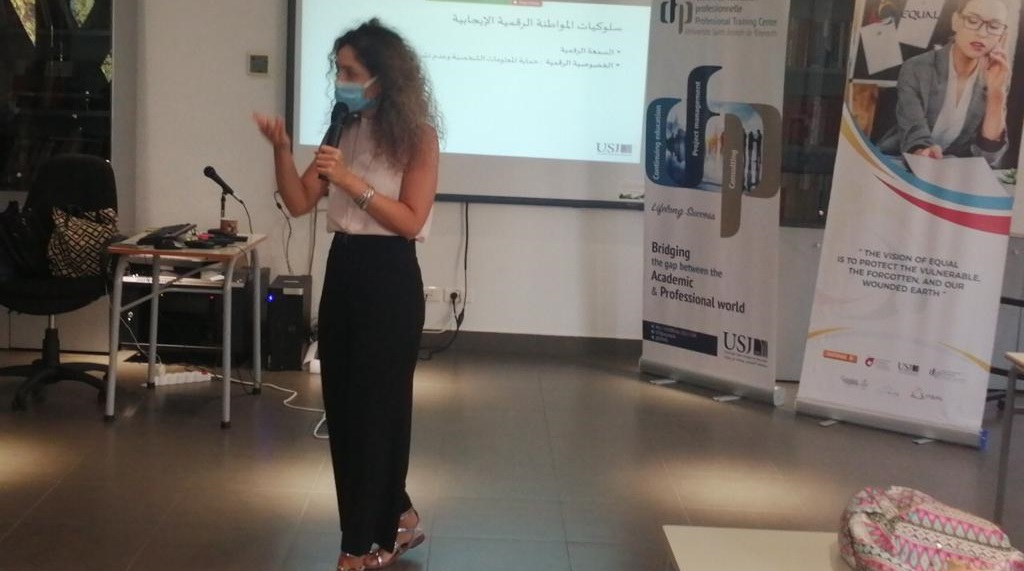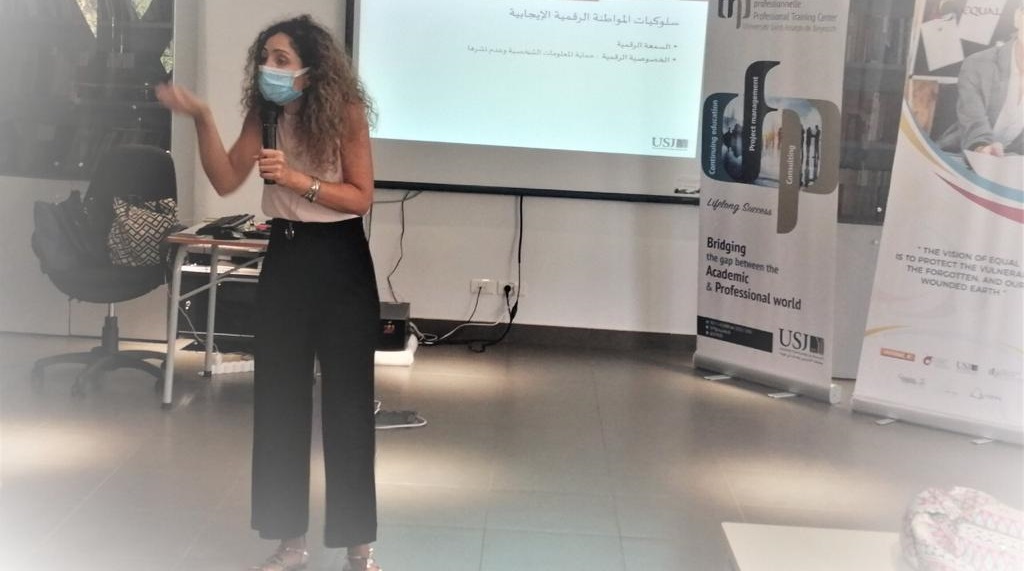© 2025 Center for Digital Innovation and AI
La formation aux compétences de vie dispensée par l’organisation non gouvernementale EQUAL en collaboration avec le centre de formation continue de l’Université Saint-Joseph de Beyrouth a assuré une série de sessions de formation sur » la littératie numérique » du 4 au 6 octobre pour autonomiser les femmes et leurs familles résidant dans les quartiers pauvres par le biais du numérique.
Based on the conviction that digital literacy is needed for women to enable them to have right access to education, right access to employment and right access to equitable resources, Mrs. Wadad Wazen Gergy, Head of UNTE, designed and delivered a session that lines up with the values and objectives of the unit by contributing to the improvement of digital literacy at the national level.
L’objectif de la session était de sensibiliser les participants à l’importance de développer des compétences en littératie numérique à la suite de plusieurs scandales majeurs de désinformation.
En fait, la « littératie numérique » est définie par la loi de 2010 sur les services internationaux des musées et des bibliothèques comme « la capacité à utiliser les technologies de l’information et de la communication pour trouver, évaluer, créer et communiquer des informations, nécessitant à la fois des compétences cognitives et techniques ».
La pandémie et les blocages qui ont suivi ont forcé toute l’humanité à adopter les technologies numériques rapidement. Dans nos courtes sessions, nous nous sommes concentrés principalement sur les principales composantes de l’élément civique qui s’apparente à la citoyenneté traditionnelle où les individus ont des droits et des responsabilités qui doivent être respectés. La sécurité en ligne, la construction de l’identité, la gestion de la réputation, l’étiquette et la participation constituent une partie importante de l’élément civique.
À la fin de l’atelier de deux heures, les participantes ont pu :
- Identifier les règles élémentaires de sécurité sur Internet.
- Comprendre la nétiquette en ligne et les conséquences possibles de la publication d’informations en ligne.
- Utiliser Internet pour élargir leur recherche d’emploi et préparer leur future carrière.
À chaque session, les participantes ont eu la chance de découvrir et de mettre en pratique des liens utiles qu’elles peuvent utiliser dans leur vie quotidienne.
Les interactions que nous avons eues pendant la session ont été très encourageantes. Les participantes ont fait preuve d’un haut niveau d’engagement et n’ont pas hésité à partager leur expérience et leurs histoires personnelles, se sont écoutées et ont posé des questions pertinentes sur le sujet. À la fin des sessions, la plupart des participantes ont exprimé leur satisfaction et se sont renseignées sur des outils supplémentaires qui les aideront à acquérir plus de connaissances et à développer davantage de compétences numériques.


The life skills training provided by EQUAL in collaboration with the center for continuing education of Saint-Joseph University of Beirut delivered a series of training sessions on “Digital literacy” from 4 to 6 October to empower women and their families residing in poor neighborhoods through digital skills.
Based on the conviction that digital literacy is needed for women to enable them to have right access to education, right access to employment and right access to equitable resources, Mrs.Wadad Wazen Gergy, Head of UNTE, designed and delivered a session that lines up with the values and objectives of the unit by contributing to the improvement of digital literacy at the national level.
The aim of the session was to raise awareness among participants about the importance of developing digital literacy skills in the wake of several major misinformation scandals.
In fact, “Digital literacy” is defined by the International Museum and Library Services Act of 2010 as, “the ability to use information and communication technologies to find, evaluate, create, and communicate information, requiring both cognitive and technical skills”.
The pandemic and the ensuing lockdowns forced all humanity to accelerate their adoption of digital technologies. In our short sessions, we focused mainly on the main components of the civic element that is similar to traditional citizenship where individuals have rights and responsibilities that should be respected. Online safety, building identity, managing reputation, etiquette, and participation constitute a major part of the civic element.
By the end of the two-hour workshop, participants were able to:
- Identify basic internet safety rules.
- Understand online etiquette “netiquette” and the possible consequences of posting information online.
- Use the internet to expand your job search and prepare for your future career.
In every session, participants had the chance to discover and practice useful links they can use in their daily life.
The interactions we had during the session were very encouraging. Participants showed a high level of engagement and did not hesitate to share their personal experience and stories, listened to each other and asked questions relevant to the topic. At the end of the sessions, most participants expressed their satisfaction and inquired about additional tools that will help them to acquire more knowledge and develop more digital skills.


Leave a Reply Cancel reply
CINIA is located on the 7th floor of the USJ Human Sciences Campus on Damascus Street in Beirut.
Do not hesitate to contact us at cinia@usj.edu.lb
or call us at +961 1 421 000 extension 5923/5924.
© 2025 Center for Digital Innovation and AI. Created for free using WordPress and Kubio


No responses yet